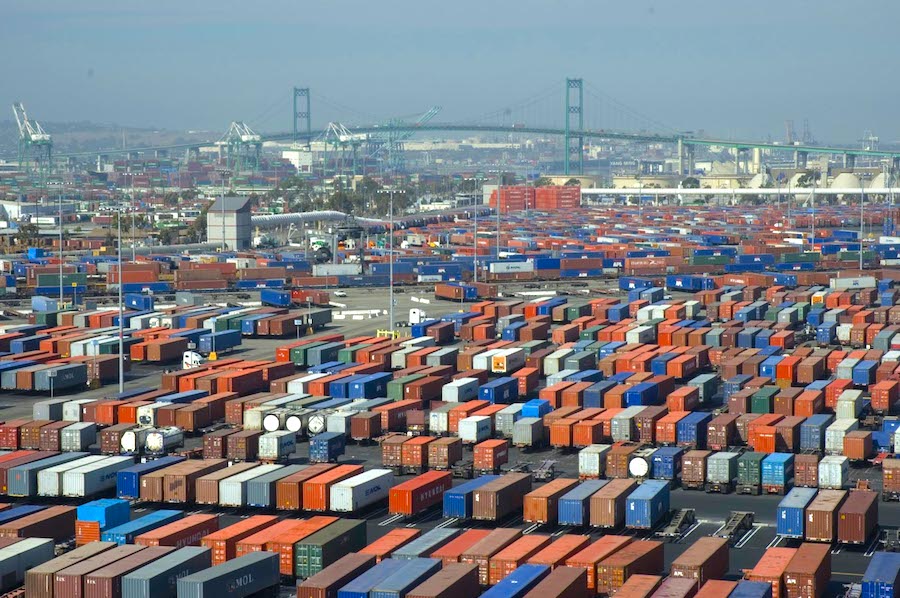The Port of Long Beach had its busiest month ever in June, but an intensifying trade war could stunt the momentum seen at the port as goods shipped to and from China become increasingly expensive for consumers on both sides of the Pacific Ocean.
The port’s June report showed that container volume increased 14.2 percent compared to June 2017, with the equivalent of roughly 752,000 standard-size containers shipped to and from the facility, which was 4.4 percent higher than the port’s previous record month.
News of the record-setting month comes in the middle of escalating trade tensions between the Trump administration and China, with both sides levying tens of billions of dollars in tariffs and the administration threatening to ratchet those up to $200 billion in goods.
Two-thirds of the port’s revenue comes from trade, so anything that adversely affects that could have dire financial consequences for one of the nation’s busiest ports.
It’s estimated that the Port of Long Beach alone supports about 300,000 jobs in Southern California, something that could be negatively impacted if trade is reduced due to tariffs and tenants at the port decide to slash staffing. To date, $34 billion in mutual tariffs have been levied by the two countries, which so far have had little effect on business as shown by the port’s most recent report.
Port CEO Mario Cordero said that if the tariffs increase to $50 billion, cargo in Long Beach could dip by over 7 percent.
Cordero is optimistic that a healthy economy will continue to support high levels of activity at the port, but also wary of the impacts that a protracted tit-for-tat trade war with China could have. A report in the New York Times surfaced Wednesday that proposed tariffs on up to $200 billion of goods like Chinese fish and chemicals could more than double as President Trump instructed staff to look to marking up tariffs from ten percent to 25 percent.
Port of Long Beach Sets All-Time Record for Busiest Month in 106-Year History
About 70 percent of imported goods coming into the San Pedro Bay port complex, which includes the Port of Los Angeles, are from China. About one-third of the exports leaving the port are bound for China, with the 2017 cargo value figure sitting at about $173 billion.
Some of the port’s other import trade partners are other Pacific Rim countries like Taiwan, South Korea, Japan and Vietnam. Some of its largest export partners include Australia as well as China and the rest of Southeast Asia. China-US trade relations will be the focus of a panel discussion August 7 in Long Beach where trade experts will talk about whether the announced tariffs could eventually morph into a trade war.
Cordero said the majority of the products coming into the port are household wares like furniture, clothing and footwear as well as toys, electronics and auto parts. He cautioned that because something is branded as American doesn’t mean that its components originate from domestic producers.
“When you make reference to American cars, American cars as we know them today, there’s no true American car that has all parts manufactured in the United States,” Cordero said. “When we talk about what we know as a domestic vehicle, that vehicle is composed of parts that have been imported.”
Cordero pointed to Apple, based in the Northern California city of Cupertino, which manufactures some of its products in China—including the ubiquitous iPhone. Cordero said about $70 billion worth of iPhones were shipped to the United States in 2017, but a tariff placed on any one product—like an iPhone—would have consequences for countries outside of the U.S. and China.
“When you look at that cell phone, it may have come from China, but part of that are also parts that came from other countries,” Cordeo said, referencing other regional countries like Japan and South Korea. “So that iPhone that we have from China, the fact of the matter is when you start applying tariffs to that commodity or consumer good it actually impacts other countries, not just China.”
The company’s [Apple] earnings were announced amid escalating rhetoric around tariffs between the U.S. and China. CEO Tim Cook said that while the company’s products hadn’t been hurt by tariffs imposed so far, Apple is still examining the impact of proposed U.S. tariffs on $200 billion worth of Chinese goods. Cook said he’s “optimistic” the countries will work out their differences.
“Each country can only prosper if the other does,” he said.
Port of Long Beach Breaks Cargo Record for Second Consecutive Month
These increases could come on the heels of the United States Commerce Department releasing figures that showed U.S. gross domestic product grew by over 4 percent in the last quarter, the largest increase since 2014.
“The unfortunate aspect to this tariff conversation that we’re having about this trade war is it comes at a time where not only have we had a relatively good global economy, but obviously a good domestic economy,” Cordero said. “That’s the irony where we’re at now.”
For now, Cordero remains optimistic that the port will continue its potentially record breaking year and that the worst case scenario involving hundreds of billions of dollars in tariffs, likely leading to job losses, can be averted.
He noted the port’s ability to rebound from the economic downturn in the mid-2000s with gradual growth culminating in last year’s record setting year. The port, Cordero said, “has been able to weather and navigate whatever the crisis has been.”
The Associated Press contributed to this report.
[The August 7 panel discussion hosted by the Law Offices of Keesal, Young & Logan and is scheduled to begin at 5:00 p.m. The office is located at 400 Oceangate Long Beach, CA 90802 on the 14th floor. Tickets to the event can be purchased here.]
This article has been updated to correct the date of the panel discussion.


